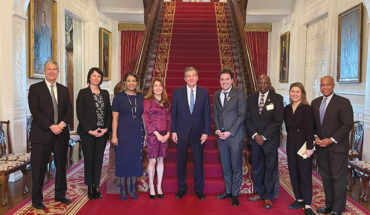
The Powell GT chorus rehearses before its performance in Meymandi Concert Hall on April 5. The fourth-and fifth-graders had practiced for months, coming in to rehearse at 8 a.m. before their school day began.
Raleigh Fine Art Society’s Choral Celebration
by Mimi Montgomery
photographs by Jillian Clark
It’s a Tuesday evening in April, and Meymandi Concert Hall is packed. In a few short minutes, Powell GT elementary school’s chorus will take the stage, and the kids are shushing each other as they wait in the wings for their cue. Their fourth- and fifth-grade faces are bathed in the blue light of backstage bulbs as they whisper last-minute notes and bits of advice to each other under the din of the audience outside and the sounds of the accompanists warming up. They’ve been counting down the months to this night. Their moment is finally here.
On the other side of the curtain, it’s not the usual symphony crowd anticipating a night of classical music – it’s kids like them, all of whom will also have their own chance to perform. This is the first night of an annual two-night Raleigh Fine Arts Society Choral Celebration, bringing Wake County elementary school choruses to the capital city’s finest stage to perform for their parents, friends, and the public. The kids are all dressed in their best, some in white button-downs and dress pants, and others in black dresses and bows.
As the audience goes quiet, the Powell students fidget anxiously and giggle; at the last minute, their teacher, Terri Gervais, confiscates phones from two of them. The kids stand up straight. It’s time to go on.
“I’m so ready,” Damarian King, 11, mouths, a grin on his face.
Leaving a legacy
Powell is one of dozens of schools that have participated over the last 17 years in this annual concert, held each spring. Created in 1999 by RFAS founding member Martha Zaytoun, the event added music to the group’s lineup of programs designed to promote literature and the visual arts. The event rose in prominence in 2001 when it moved to Meymandi, and so many schools wanted to participate that RFAS had to add an extra evening to accommodate them all. Its popularity has only grown. This year’s Celebration included a record 16 schools and nearly 1,000 children singing.
From the beginning, the event has showcased fourth- and fifth-grade choruses from Wake County schools, and has aimed to help improve their music as well as showcase it. The choruses are reviewed by an adjudicator, who provides notes and comments ahead of the performance, in which each school performs two songs individually and sings three all together. Because young children’s voices have their own special quality, working with them is different than conducting teenagers or adults, and requires experienced conductors trained in elementary music. The Celebration’s advisors (Ann LeGarde, Kenya Snider, and Ann Goldfinch) are all former or current teachers certified to teach music to children; they help structure the flow of the performance and help each participating school’s conductor select music that will showcase their children’s voices in the best way.
This year, RFAS also assigned a choral clinician to each school who attended two rehearsals, and not only worked with the children on their selected music pieces, but provided feedback to their teachers, too. In addition, RFAS invited all of the schools’ choral teachers to a workshop with Dr. Frances Page, a professor of music at Meredith College and the conductor of the Capital City Girls Choir. Teachers filled out professional development forms before and after their school’s performances, as well, to chart their own growth and reflect on their students’ improvements.
“This is something else we can do where we’re giving back,” says Dena Silver, chair of the Choral Celebration. “This is something where kids learn, where teachers learn. So, over time, you’re building on all that.”
Silver says that’s important, because lower school choirs are at risk. “A lot of teachers and school administrators don’t feel that they’re necessary. So, we felt we needed to continue to improve the profile of those schools and elementary choral programs, and if we did that, they would maybe have a longer life.” Celebration advisor and Farmington Woods teacher Ann LeGarde says it’s working. “They gain so much confidence from that opportunity. When you finally see them on stage and hear them … their faces are lit up by the beautiful lights and they’re so excited and so proud of themselves,” she says. “It’s definitely a memory that lasts a lifetime. It’s just beautiful. It’s really beautiful.”
Going the extra distance
Of the 16 schools participating in the Choral Celebration, Powell is one of four newcomers. A Raleigh magnet school, it is a diverse, arts-based elementary school near the Oakwood area focused on play and ingenuity. The children in its fourth- and fifth-grade chorus love to perform and go to great lengths to do so, arriving at 8 a.m. to rehearse before the school day begins. One March morning, some are sleepy, dragging their backpacks into the colorful room, but most seem excited. There’s a palpable buzz in the air – today their RFAS-assigned choral clinician, Anne Mormon-Smith, is there to listen to the group rehearse the two pieces they’ll sing in the Celebration.
It’s clear that Gervais, Powell’s general music and chorus teacher, has set expectations for her students: They perch on the edge of their seats with rail-straight backs. In Gervais’ book, learning the correct way to carry a note or breathe from their stomachs is just as important as learning professionalism, responsibility, and cooperation. The group prepares to launch into a version of their favorite song, The Moon. “What is the feeling in The Moon?” Gervais calls out to her class. “Calm!” one child shouts out. “Soothing,” says another. “It makes me feel inspired and hopeful,” pipes up a voice from the back.
She implores the group to use that imagery to infuse the piece with emotion. Gervais employs a variety of techniques to communicate what could be complicated musical terms to a group of elementary schoolers. She asks the kids to “color” the music with their voices to create emotion and movement in the music, and uses visuals like pulling an imaginary ribbon through the air to have them carry out a note and build a crescendo.
“The kids that are coming really, really love to sing,” says Gervais. “They just have a natural ability.”
After a rousing rendition of their second song, the classic Simple Gifts, and some helpful feedback from Smith, it’s time for the first class of the day. Everyone’s in a good mood after a morning of singing. Fourth-grader Elexis Creech, 10, says she can’t wait to perform at Meymandi. Her brother has seen the auditorium, and “he said that it was humongous and that it’s pretty. So, I’m really excited.” And more than a little ready to belt out the tunes. “I honestly think I was born to be in the spotlight,” she adds.
That zest for performing runs through the group. Timmy Richardson, a 10-year-old fifth-grader, says he’s “just a little bit nervous,” but that he loves “to be in front of an audience.” The excitement is well-earned, Gervais says. The kids have taken it seriously, and it’s going to pay off. It’s an important lesson in working diligently towards achieving a goal. “It is hard work,” she says. “I tell them all the time – it’s hard work, but it’s fun. That’s what everything worthwhile is.”
Gervais knows all about that. “She’s gone above and beyond,” says Curtis Brower, Powell’s principal; he credits the chorus’ success to Gervais’ dedication, offering early rehearsals and ensuring that students who want to participate will be able to do so. Interest in what she’s doing has been so high she’s recently added a third-grade chorus, too, and many of her students have gone on to audition for outside groups like the Raleigh Boychoir.
When she told her students they were headed to Meymandi April 5, they couldn’t contain themselves. “They were jumping up and down,” she says. It’s a first-time experience for many of the children in her group. The opportunity to perform in a real auditorium on a professional stage with excellent acoustics is a rare one. “This is a blending of backgrounds of kids,” says Gervais. “Some kids have probably gone to see things at the theater itself or the concert hall … (but) a lot of the other kids were never exposed to that. … So this is really a big thing for them to be able to sing on that stage.”

Choral teacher Terri Gervais conducts the Powell GT chorus as they perform on the stage at Meymandi Concert Hall.
Keep singing
On performance night, it all comes together. The kids beam as all 500 of them come together to sing the last communal song of the evening, Stars, a piece commissioned by RFAS to honor Zaytoun. The sound of so many earnest voices rising up and into the ceiling of the auditorium is the pinnacle of an already memorable evening, and the students rush out to meet their waiting parents with grins on their faces. Teachers hand out cookies and hugs, and the kids high-five each other. They did it.
It’s RFAS’ hope that many of the participants will continue singing long after this evening and help to preserve this celebration of music in Wake County. As everyone begins to leave, many of the students keep carrying the tunes even as they exit Meymandi with their families, humming the familiar melodies as they go their opposite directions into the night. Some are headed off to middle school next year; some have another year in the
chorus. But one thing’s pretty clear: They will all keep singing.








